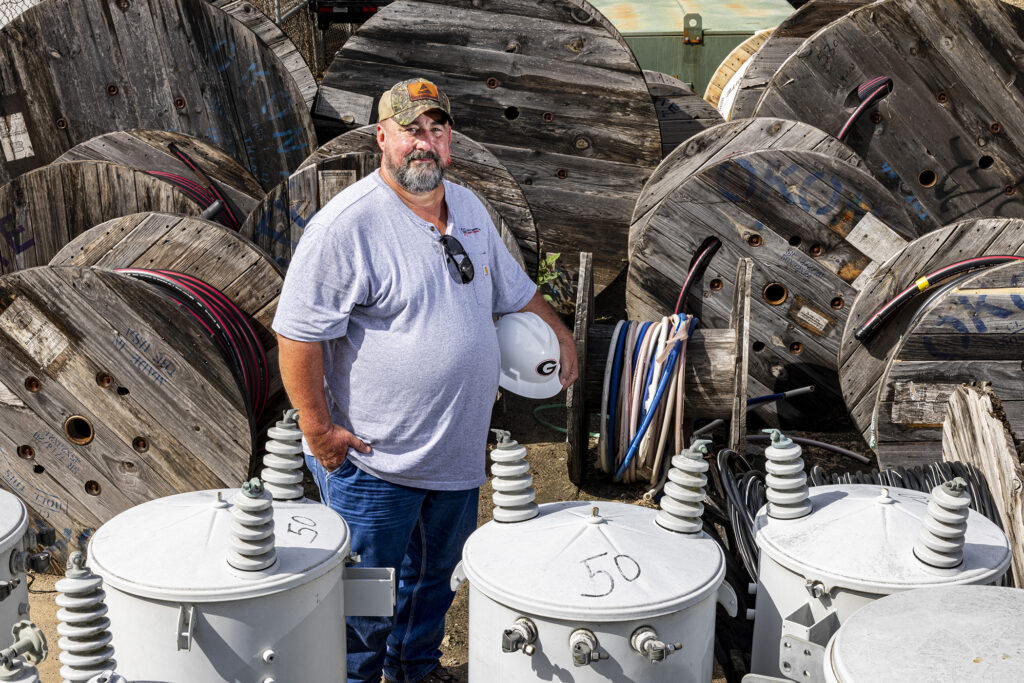As the lead electrical lineman for Operations and Maintenance (O&M) in the Facilities Management Division (FMD), Mike Kennedy and his team of six are responsible for maintaining UGA’s high-voltage system, which powers the entire Athens campus and a few facilities in surrounding counties.
“Our No. 1 goal day to day is to keep the lights on across the footprint of campus,” Kennedy said. “We are not a power company; we’re here to facilitate the research and teaching mission of the university.”
Kennedy helps his team achieve this goal by emphasizing collaboration and teamwork. He thinks of his crew as working with him rather than for him.
“I may be the lead, but it’s 100% a team effort. Everybody has a voice, especially when it comes to what we do,” he said.
Kennedy joined FMD O&M in 2013 as a lineman after 13 years with a private contracting company. When the lead lineman position opened in the fall of 2019, he seized the opportunity. But just a few months into his new role, the COVID-19 pandemic ushered in a wave of changes.
While many employees transitioned to remote work, Kennedy ‘s team, along with several other UGA departments, had to maintain in-person operations. Kennedy, under the direction of his managers, established an alternating schedule of “red and black” days to ensure continuous operations while mitigating health risks.
“At that time, it was the Wild West,” he said. “We could not risk having our whole crew out, so we were stringent. And we got a lot done.”
When campus returned to its pre-pandemic bustle, Kennedy’s team was ready to tackle new projects. Their scope of work includes maintenance, renovations and new construction projects. They collaborate with many internal and external partners, from the Office of University Architects to Georgia Power.
“It’s a rewarding field to be able to see what you’ve done,” he said. “It’s hard work — it’s hot, it’s cold, it’s wet — but it’s still rewarding.”
Every building on campus is connected through a network of transformers and underground cables that converge at a central substation, which puts out 7200 volts. For comparison, a standard wall outlet supplies 120 volts.

The team’s responsibilities change daily. One day might involve working underground in a concrete bunker surrounded by hot wires; another day may entail overhead work in a bucket truck. Whether replacing a transformer or fixing a streetlight, Kennedy prioritizes his team’s safety.
“I want everybody to go home that day,” he said. “No matter the situation, we take the time to do it right. If we have a situation come up that was not discussed in the pre-job briefing, we call for a standdown to discuss the issue and formulate a plan before proceeding.”
Kennedy’s team includes a mix of new and experienced linemen. Recently, they were tasked with replacing the transformer that powers Sanford Stadium with a significantly larger one. At the time, two of his crew members were brand new to the team.
Unlike most transformers that sit on the ground, this one was located underground, which required more heavy machinery, precision and, most importantly, teamwork.
“Communication is the No. 1 thing you’ve got to have,” Kennedy said. “If you’re not paying attention, something can go wrong, especially when you have so many moving parts.”
The project was completed successfully. The team removed the old transformer and set the new one with no adjustment needed. Kennedy supervised the teamwork throughout the process.
“I came away from that feeling really proud,” he said. “Seeing how everybody was in tune, paying attention and communicating — that’s when the new guys really became part of our team.”
While most training happens in the field and in specialized courses, Kennedy and his team keep their skills sharp with practice equipment behind their shop at Chicopee. He wants them prepared for anything because he never knows what the next day might bring.
“What we do here is 100% for this campus,” he said. “It feels good to serve something that’s more than yourself. ‘Elevate the G’ — that’s what we’re trying to do.”


